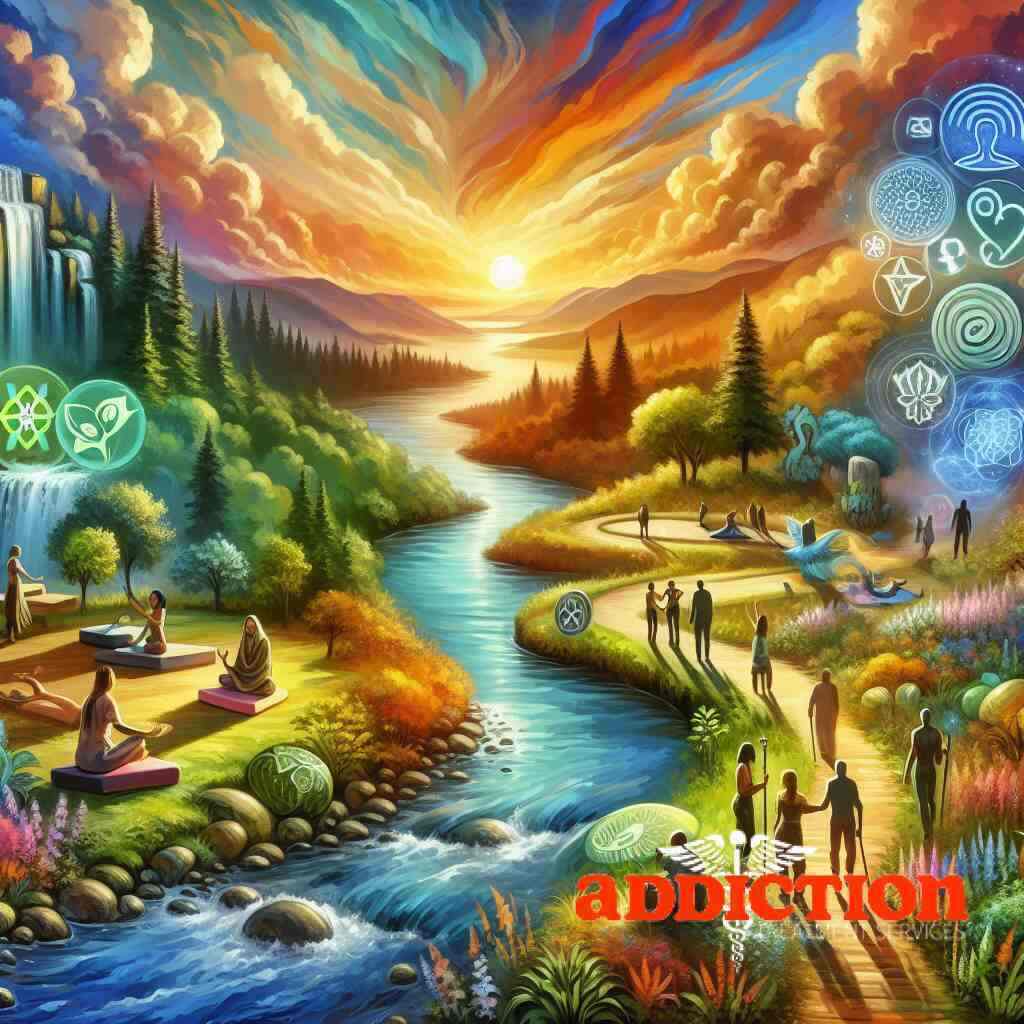 Posted On: 05/17/2025
Posted On: 05/17/2025Unveiling the Future of Rehab: A Vision for 2025
Emerging Trends in Addiction Treatment
The landscape of addiction treatment is witnessing transformational changes, driven by innovative addiction treatment methods that are reshaping traditional approaches. The year 2025 promises to be a milestone with the emergence of newer methodologies that prioritize not just recovery but sustainable healing. This evolution focuses on holistic recovery solutions at treatment centers, where individuals are treated not just for their physical dependence but are also given psychological and emotional support. As we delve deeper into these trends, the emphasis is on developing a more comprehensive understanding of addiction and recovery, integrating science-based protocols with empathetic care.
The Shift Towards Personalized Rehab Programs
Personalization in treatment means recognizing that each individual’s journey to recovery is unique. With the rise of data-driven insights, personalized addiction care services near you ensure that rehabilitation programs are tailored to the specific needs and circumstances of each patient. Such targeted approaches not only improve efficacy but also enhance the patient experience. By focusing on the nuances of personal history, genetic predispositions, and individual preferences, treatment facilities aim to offer solutions that are both impactful and lasting. This shift represents a paradigm change in providing advanced addiction recovery methods that align with the unique requirements of each person on their path to sobriety.
Integrating Technology into Recovery Pathways
Technology in addiction recovery is no longer a futuristic concept; it is rapidly becoming an integral part of treatment modalities. Digital rehabilitation tools for addiction are revolutionizing the way patients interact with their recovery processes. From virtual reality scenarios that help patients confront and manage triggers to AI-driven insights that provide real-time feedback, the potential is immense. Moreover, mobile health applications offer continuous support, making the journey to recovery more accessible and manageable. This digital transformation ensures that individuals battling substance use disorders receive cutting-edge rehab options no matter where they are, paving the way for a more tech-integrated treatment framework.
Innovations in Clinical Treatments: Next-Gen Therapies
Revolutionary Breakthroughs in Medication-Assisted Treatments
Medication-assisted treatments (MAT) are experiencing a revolution, with new drug formulations emerging to enhance recovery outcomes. 2025 will see the evolution of MAT becoming more precise, aligning closely with an individual’s specific needs, and minimizing withdrawal symptoms. This innovation involves state-of-the-art employments of medications that are customarily supplemented with counseling and other supportive care. These advanced addiction treatment services emphasize the reduction of cravings and stabilization of brain chemistry, advocating a comprehensive care strategy. Such breakthroughs signify a vital component in modern addiction treatment centers committed to providing a more patient-centric approach.
Advanced Behavioral Therapies and Psychological Interventions
Behavioral therapies have always been a cornerstone in treating substance use disorders, but 2025 heralds an age where these treatments become more refined and evidence-based. Cognitive Behavioral Therapy (CBT), for example, is now being integrated with innovative technologies like real-time data collection and analysis to personalize therapeutic interventions. This advancement allows therapists to create more effective, adaptable strategies in treating addiction. Furthermore, the use of psychotherapy in addiction treatment alongside novel psychological interventions ensures a balanced incorporation of emotional healing into the recovery journey. As we move forward, these therapies promise to deliver enhanced support, promoting better recovery processes.
Exploring the Role of Genetics in Tailored Recovery Solutions
The study of genetics is transforming our understanding of addiction predispositions and response to treatments. By exploring genetic markers, addiction treatment can become significantly more individualized, recognizing the biological factors that contribute to addiction. This exploration in 2025 will lead to superior integrative addiction recovery methods that align with one’s genetic profile, ensuring efficacy and lowering the risk of relapse. Incorporating genetics into addiction solutions complements existing machines like the drug detoxification process, allowing treatment centers to craft truly personalized recovery plans. This pivotal role of genetics signifies an era where precision medicine meets the intricate needs of addiction rehabilitation, paving the way for groundbreaking developments in the treatment landscape.
The Digital Transformation: How Technology is Reshaping Rehab

Virtual Reality and Its Role in Treating Substance Use Disorders
Virtual reality (VR) is revolutionizing the addiction treatment landscape by offering immersive environments that simulate real-life scenarios without the associated risks. This cutting-edge technology allows patients to confront and manage triggers in a controlled setting, offering a safe space to develop coping mechanisms. As patients encounter challenging situations, VR provides immediate feedback, enabling therapists to tailor interventions and monitor progress. This innovative approach significantly enhances the efficacy of addiction treatment services, fostering resilience and empowering individuals to navigate real-world challenges. By integrating VR into treatment programs, addiction treatment centers are redefining how substance use disorders are approached, creating a paradigm shift toward more interactive and effective rehabilitation techniques. For those interested in exploring these digital rehabilitation tools for addiction, the potential to transform traditional recovery methods is immense.
Leveraging AI and Machine Learning for Personalized Care
Artificial intelligence (AI) and machine learning are at the forefront of creating personalized rehab solutions, tailoring treatment plans to the specific needs of each patient. These advanced technologies analyze data from numerous sources to identify patterns and predict outcomes, allowing for a more customized approach to addiction care. By utilizing AI-driven insights, treatment facilities can optimize protocols and adjust strategies to meet individual patient needs effectively. This technology-driven personalization ensures a higher success rate by addressing the unique complexities of each patient’s journey toward recovery. Such advancements underscore a transformative era in addiction treatment, where precision medicine meets empathetic care, making recovery a more bespoke and efficient process. As AI continues to evolve, its integration promises to enhance patient outcomes significantly, paving the way for emerging addiction treatment trends in 2025.
Digital Therapeutics and Mobile Health Applications
The rise of digital therapeutics and mobile health applications marks a new frontier in addiction treatment, providing patients with accessible and consistent support throughout their recovery journey. These tools offer a wealth of resources, including therapeutic exercises, educational content, and tracking capabilities to monitor progress in real time. Mobile applications bridge the gap between in-person treatment and continuous support, ensuring that individuals have access to assistance whenever and wherever needed. As these applications become more sophisticated, they are increasingly tailored to specific addiction treatment programs, offering features that enhance accountability, encourage engagement, and foster long-term recovery. This digital evolution signifies a shift towards more integrated and flexible treatment architectures, empowering patients with tools that enable self-management and resilience against relapse. Individuals seeking to engage with INT treatment options can benefit from these technological advancements, which complement traditional therapies and fortify the recovery process.
Holistic and Integrative Approaches: The New Frontier
The Rise of Holistic Addiction Care Advancements
In recent years, holistic addiction care advancements have become a cornerstone in the movement towards more comprehensive recovery options. These approaches emphasize the importance of treating the mind, body, and soul as an interconnected system. This paradigm shift is ushering in an era where holistic recovery solutions at treatment centers are not just an add-on but integral to the patient’s healing journey. Such interventions often incorporate physical activities, mindfulness practices, and therapy sessions that address emotional well-being. By adopting these methods, addiction treatment centers aim to build stronger, more resilient recovery processes that address the person as a whole rather than merely their addiction symptoms, exploring holistic recovery processes.
Integrative Techniques: Combining Traditional and Modern Therapies
The fusion of traditional and modern therapies is a significant development in the landscape of addiction treatment. Integrative techniques are not limited to just one form but encompass a variety of practices tailored to suit individual needs, as detailed in our guide to personalized care at addiction treatment. These might involve pairing cognitive behavioral therapy with acupuncture, or medicinal treatments alongside meditation practices. Such combinations have been shown to enhance treatment efficacy by offering patients a multi-faceted approach to healing, allowing them to benefit from both empirical science and time-honored healing practices. This balance ensures that individuals receive a robust treatment architecture that may include both groundbreaking rehab innovations in Pennsylvania and classic therapeutic methods.
The Role of Nutrition and Wellness in Sustained Recovery
Nutrition and wellness are emerging as critical components in maintaining long-term recovery from substance use disorders. A well-balanced diet, regular physical activity, and a focus on overall wellness contribute to both physical healing and emotional stability. Incorporating wellness strategies into recovery plans has been shown to enhance the resilience of individuals, helping them resist substance use triggers and cope more effectively with stress. Nutritional guidance is now being integrated into many addiction treatment programs as a fundamental aspect of the healing process, ensuring that patients develop healthier lifestyles that support their sobriety. These holistic strategies serve as invaluable tools in cultivating a sustainable recovery path, enriching traditional treatment modalities with energy and vitality.
Towards a Comprehensive Recovery Ecosystem
Building Supportive Communities and Alumni Programs
The future of addiction treatment hinges on creating supportive communities that foster long-term recovery. As we move into 2025, addiction treatment centers recognize the value of alum programs in maintaining sobriety post-treatment. These initiatives provide a network of support, enabling individuals to connect with peers who share similar experiences. Alum programs emphasize continued engagement through counseling, social events, and mentoring, which are crucial components in a comprehensive recovery ecosystem. By nurturing these communities, treatment facilities offer vital recovery support services that are indispensable in navigating the complexities of life after treatment. This shift towards a community-oriented approach not only strengthens individual resilience but also promotes collective healing, where support networks become integral pillars in the recovery journey.
Evolving Recovery Support Services to Prevent Relapse
Preventing relapse is a pivotal aspect of addiction recovery, necessitating the constant evolution of support services. In 2025, recovery support services are expected to integrate innovative addiction treatment methods, combining technology and personalized care to mitigate relapse risks. This involves utilizing AI-driven insights to detect early signs of withdrawal or stressors that may trigger substance misuse. By continuously updating treatment protocols, facilities can provide tailored interventions that meet the unique needs of each individual. Furthermore, the incorporation of cutting-edge rehab options, such as digital therapeutics, into intensive outpatient programs ensures that recovery paths remain dynamic and effective. With these advancements, treatment centers aim to create an adaptable framework that not only addresses the immediate challenges of addiction but also anticipates future hurdles in the recovery process.
Enhancing Family Involvement and Education
Family involvement is a crucial component of a successful recovery strategy, offering emotional support and understanding. In 2025, addiction treatment services near you will likely expand educational programs that equip family members with the necessary skills to support their loved ones. Through workshops and counseling sessions, families are educated on substance use disorders and the impact they have on mental health services. This knowledge empowers them to engage constructively in their loved one’s recovery journey, fostering a supportive environment that can help prevent relapse. Enhanced family engagement also involves teaching effective communication and stress management techniques, which are vital in promoting a harmonious home environment. Such initiatives indicate a commitment to holistic recovery solutions at treatment centers, where family dynamics are integral to sustaining long-term sobriety. By embracing comprehensive education, families become instrumental in facilitating recovery, providing invaluable support that reinforces treatment outcomes.
Conclusion: Embracing Progressive Rehabilitation Frameworks
The Promise of Innovative Rehab Solutions
As we stand on the cusp of 2025, the promise of innovative rehab solutions shines brightly, offering renewed hope for those grappling with substance use disorders. The rapid integration of technology, personalized care strategies, and holistic treatment methods is transforming the way we approach addiction recovery. These pioneering recovery strategies emphasize the need for more individualized and effective methods that address the entire spectrum of addiction and recovery. By utilizing cutting-edge rehab options, rehabilitation centers are poised to enhance recovery outcomes significantly, ushering in an era where addiction treatment is more accessible, effective, and sustainable than ever before.
Looking Ahead: Preparing for a Transformative Era in Addiction Treatment
Looking ahead, the landscape of addiction treatment is ripe with potential. The evolving addiction treatment centers are now equipped with the tools and knowledge to address the complex needs of individuals seeking recovery. The next-gen addiction treatment facilities are not just adapting but thriving in this transformative era by offering adaptable protocols suited to individual patient needs. Such a progressive approach highlights the commitment to creating more resilient rehabilitation frameworks, including state-of-the-art addiction treatment in California, ensuring a broad reach and impact. With these advancements, we are not merely keeping up with the times but are prepared to lead the next phase of addiction treatment innovations.
Fostering Hope and Healing in a New Decade
Fostering hope and healing in this new decade requires a concerted effort from all stakeholders involved in addiction recovery. This means creating environments that promote healing, supporting innovative preliminary treatment stages, and expanding comprehensive addiction recovery services that are accessible to all. As we emphasize holistic recuperation paths and embrace both extensive treatment solutions in Georgia and advancements elsewhere, we build a future where recovery is an attainable goal for everyone. By placing empathy, innovation, and an unwavering commitment to patient care at the forefront, we can assure that the coming years are not just about surviving addiction but thriving beyond it.
Frequently Asked Questions
Question: What groundbreaking rehab solutions can we expect from Addiction Treatment Services in 2025?
Answer: As we look ahead to 2025, Addiction Treatment Services is at the forefront of offering innovative addiction treatments. Our state-of-the-art rehab technologies and advanced addiction recovery methods are designed to address the complexities of substance use disorders comprehensively. By integrating technology-driven addiction recovery tools and personalized rehab programs, we are committed to providing cutting-edge rehab options that are both effective and sustainable. Our commitment to pioneering recovery strategies ensures that each patient receives individual attention tailored to their unique needs, fostering hope and promoting transformative rehabilitation outcomes.
Question: How do Addiction Treatment Services utilize technology-driven addiction recovery in their treatment programs?
Answer: At Addiction Treatment Services, we are leveraging digital rehabilitation tools and technology-driven addiction recovery protocols to enhance our treatment programs. By incorporating virtual reality, AI-driven insights, and mobile health applications, we provide patients with an immersive and supportive recovery experience. These tools allow individuals to manage triggers, receive real-time feedback, and access continuous support throughout their recovery journey. Our technology integration ensures that futuristic treatment protocols are accessible, promoting more comprehensive treatment architectures that empower patients to overcome substance misuse effectively.
Question: In the evolving landscape of addiction treatment, what is the role of personalized rehabilitation programs?
Answer: Personalized rehabilitation programs are crucial in the evolving landscape of addiction treatment. At Addiction Treatment Services, we recognize that each person’s journey to recovery is unique. Our personalized rehab programs gather data insights to tailor treatment plans that cater specifically to an individual’s history, preferences, and genetic predispositions. By offering holistic addiction care advancements and next-gen addiction treatment solutions, we ensure that our rehabilitation frameworks address the entirety of a person’s needs, enhancing recovery outcomes and reducing the risk of relapse. Our integrative addiction recovery solutions focus on creating a patient-centric approach that fosters sustained healing.
Question: How does the blog title ‘Exploring Groundbreaking Rehab Solutions for 2025’ reflect the advancements provided by Addiction Treatment Services?
Answer: The blog title ‘Exploring Groundbreaking Rehab Solutions for 2025’ encapsulates the innovative approaches and forward-thinking rehab methods offered by Addiction Treatment Services. As leaders in the rehab industry advancements, we are committed to revolutionizing the way addiction treatment centers operate by embracing emerging rehab therapies and breakthrough addiction therapies. The future of substance abuse treatment lies in implementing transformative addiction recovery services, and our continuous efforts to evolve ensure that we remain at the cutting edge of this critical field. By embracing both technological advancements and holistic treatment methods, we are preparing for a transformative era in addiction treatment that provides hope and healing for all.
Question: What role do supportive communities and alums programs play in the recovery process offered by Addiction Treatment Services?
Answer: Supportive communities and aalumsprograms are integral components of the recovery process at Addiction Treatment Services. Recognizing the importance of building a comprehensive recovery ecosystem, we actively foster supportive networks that empower individuals to maintain sobriety post-treatment. Our alalumrograms offer a sense of belonging, facilitating continued engagement through social events, mentoring, and counseling. This community-oriented approach strengthens individual resilience and promotes collective healing, ensuring that patients have the necessary support systems in place to navigate the complexities of life after treatment. By enhancing the role of these programs, we affirm our commitment to offering substantial recovery support services that make long-term sobriety an attainable goal for everyone.



